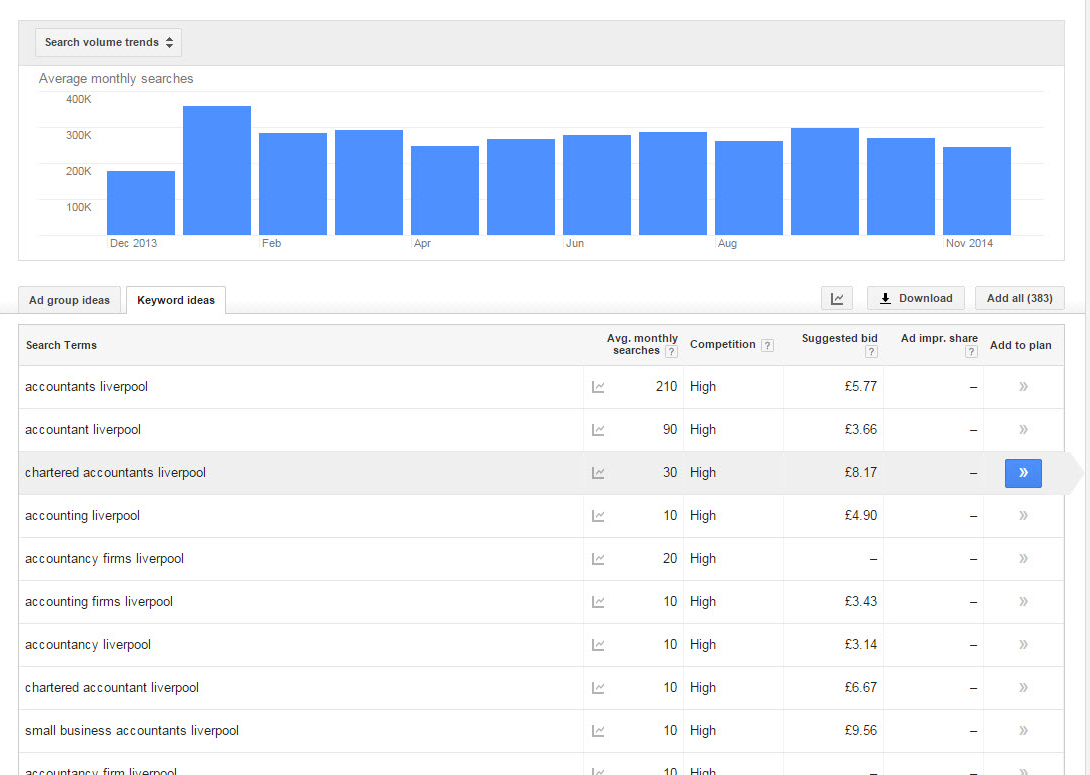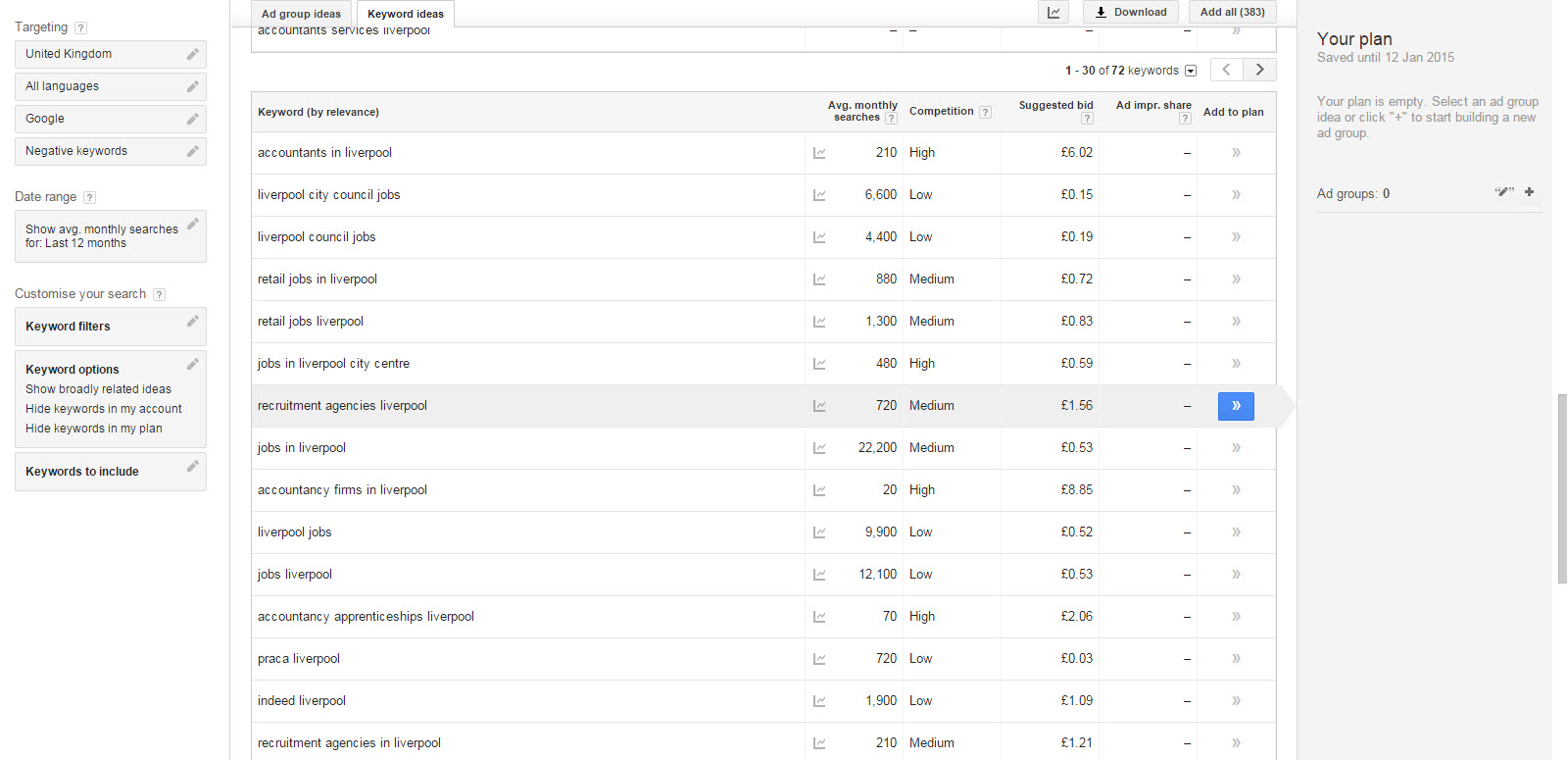If you are going to perform Search Engine Optimisation (SEO) in the hope of gaining higher rankings in search engines it is important to do SEO keyword research first.
Good keyword research can help reveal:
- which keywords potential visitors or customers are using,
- how often they use those keyword
- which keywords they don’t use
- other possible meanings to the keywords they use
- the likelihood that someone using a certain keyword will go on to become a customer
- the amount of competition around each keyword
- potential easy wins or gaps in the market
- the potential return on investment of different keywords
- the likely size of the long tail for certain keywords
- the best SEO strategy for your budget
It is different from Keyword Research that you may perform for Google Adwords advertising. With Google Adwords it is best to bid on all or most of the relevant keywords. You just need to make sure your bid is in proportion to what someone using that keyword is worth to your business. If this bid isn’t high enough then your ad wont show and you wont get any visitors using that keyword but you don’t spend any money so nothing is lost. Within Adwords the price you pay is based on what other competitor’s using Adwords are willing to pay and the quality of their campaigns. It is not effected by the natural rankings at all.
With Adwords you can also bid on a broad term for instance if you are an account you can bid on the word “accountant” but set your ads to only appear in Liverpool or whichever area you are targeting. With SEO if you wanted to rank for the word “accountant” on it’s own you would be going against the whole of the UK. You would be better targeting something like “accountant Liverpool”.
With SEO Keyword Research you need to understand which competitor’s come up in the natural rankings and what their SEO strengths and weaknesses are. The amount of SEO you need to do is dictated by the other competitor’s in the natural rankings and is not effected by the Adwords competition.
So you may find one keyword that has a lot of competition within adwords and little within the natural rankings and a different keyword for the same product or service that is the opposite. Where the 2 do effect each other is in the percentage of visitors your website will get. If there is a lot of competition within Adwords then the ads are likely to be betters and people are more likely to click on them and vice versa.
Straight From The Horse’s Mouth
The best place to go for keyword research is to sign up to Google Adwords and use the Adwords Keyword Planner. It use to be available without an Adwords account but they changed that. Don’t worry you don’t have to actually spend any money on Adwords or hand over your banking details to use it. Google get the majority of searches in the UK and Europe, maybe over 90% of searches. So it is the most reliable source of data.
Other keyword tools like Wordtracker base their data on search engines like Dog Pile and Metacrawler. These search engines aren’t very popular, especially here in the UK and Europe. They also don’t actually know what percentage of the market they occupy so Wordtracker simply multiplies the number of searches on these search engines by 200 and assumes that represents the whole market. They call it an index instead of the actual number of searches.
Once you have created an adwords account login and go to the “Tools” menu and “Keyword Planner”. Select the first option “Search for new keyword and adgroup ideas”.

List all the relevant keywords you can think of.
You may want to use a spreadsheet to come up with your initial list. For instance keeping with the accountant example these may be your initial terms that you then span them out to produce all the different possibilities that make sense:

Paste them in to the Adwords Keyword Planner. Initially it will take you to a tab called “ad group ideas”. This tab is mainly for setting up Google Adwords so for SEO research purposes it is better to click along to the next tab called “keyword ideas”. For my initial keywords it came back and showed me that there were monthly searches for the following:

The Keyword Planner also made more suggestions some of which are relevant such as “accountants in liverpool”.


To filter out a lot of the irrelevant results I could paste my list from my initial spreadsheet to do with accountants in to where it says “keywords to include”.

This will take out keywords that don’t include one of my most relevant terms. I can now click the arrow on all the relevant terms in the column called “add to plan” and then download the list. Do this for terms that don’t have a dash next to them. The dash means less that 10 searches a month, usually it means almost no searches a month. Ignore terms that aren’t relevant such as those used by people searching for a job vacancy or apprenticeship like “accounting jobs in Liverpool”.
Now download your list of keywords. There will be other data in your download relating to Google Adwords which you can ignore. Here are results for people searching for accountants in Liverpool:
Keyword
Monthly Searches
accountants liverpool
210
accountants in liverpool
210
accountant liverpool
90
liverpool accountants
90
chartered accountants liverpool
30
accountancy firms liverpool
20
accountancy firms in liverpool
20
accountant in liverpool
20
liverpool accountant
20
management accountant liverpool
20
small business accountant liverpool
10
accountancy services liverpool
10
accounting services liverpool
10
accountancy firm liverpool
10
small business accountants liverpool
10
chartered accountant liverpool
10
accountancy liverpool
10
accounting firms liverpool
10
accounting liverpool
10
accounting firms in liverpool
10
chartered accountants in liverpool
10
liverpool chartered accountants
10
As you can tell the number of searches for each keyword has been rounded to the nearest 10. Also there will be a lot of long tail searches that have such low traffic that they don’t appear on this list. For instance once a month someone may type in “experienced accountant liverpool”. If you rank high for “accountant Liverpool” then you will probably rank for lots of low volume variations. Together these low volume searches add up to a lot. But each one gets such low volume that it isn’t worth targeting them on their own.
Curious about what else SEO can do for you? Check out our local SEO packages.

No Comments